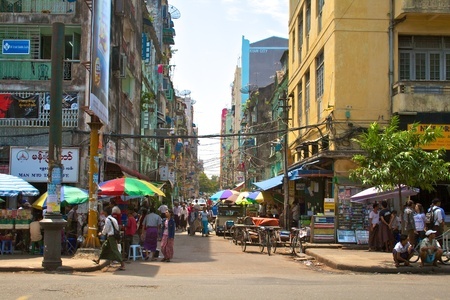11 August, 2017
Although the drafts have been ready as early as 2014, Myanmar's new IP laws have yet to be passed despite earlier forecasts. The draft bills on trademark, copyright, patents, and industrial design were forwarded to the concerned legislative committee for deliberation on 24 July 2017, and are currently awaiting deliberation. At this point, though, providing any estimate of when the transition will actually happen would be speculative at best. One of the few things known for certain is that as a "least-developed country," Myanmar has until 2021 to fulfill its obligations under the TRIPS Agreement. Still, waiting may not be the best IP protection strategy for early movers venturing into Myanmar.
Despite the slow progress, developments in Myanmar are increasingly encouraging. The US, for example, has lifted its decades-long trade sanctions against the country. The new Myanmar Investment Law was passed to facilitate foreign investment. New regulations were issued allowing foreigners to engage in retail trade of select items, such as chemical fertilizers, seeds, pesticides, hospital equipment, and construction materials — a sharp departure from strict foreign restrictions on retail trade in recent years. And finally, Myanmar is experiencing an unprecedented roll-out of telecommunications and internet connectivity services, which in turn is helping to develop the e-commerce, online media, and financial technologies markets.
Overall, a substantial and steep increase in trade is expected in the next few years. As a result, however, the rush of goods and services into the country will necessarily create conditions susceptible to exploitation and loss from counterfeiting and piracy.
It would be incorrect to assume that nothing can be done to protect IP in a rapidly-changing Myanmar. A proper navigation of Myanmar's current system of laws relevant to IP can yield IP protection strategies that may work to protect brands. Below are five key points about IP protection in Myanmar.
1. Trademark Protection is Improving
The absence of any trademark law is typically understood to mean that Myanmar law offers little, if any, trademark protection despite having a registered trademark. This may not necessarily be accurate now. While the passage of an updated trademark law would certainly be helpful, the current framework of laws and jurisprudence do recognize key legal concepts that help protect trademarks and the rights of trademark owners.
There is an established practice in Myanmar of registering a Declaration of Ownership of a trademark, which once accepted is deemed to be prima facie evidence of the ownership of a mark. However, what some may not realize is that the registration of a Declaration of Ownership is a fundamental step towards meaningful brand protection in Myanmar. With a registered Declaration of Ownership, one is deemed the prima facie owner of a mark and can therefore seek remedies from Myanmar courts.
Again, because there is no trademark law, it is easy to assume that the courts would have little guidance in settling trademark-related controversies, but again this is not the case. Landmark precedents exist in Myanmar case law, suggesting that the courts in Myanmar are taking notice of known and familiar IP legal concepts despite the absence of any specific controlling law.
For example, in one case the court held that goods need not be identical to establish that there was an intention to pass-off and that it would be sufficient that the offending good is a colorable imitation of the other. In another case, it was held that a mere translation of a mark into Myanmar language is not distinctive and is therefore a mere translation would not acceptable as a valid trademark. Finally, in a particularly significant case the court held that in order to determine which of two parties would have a better right to the use of a trademark, the totality of the circumstances would need to be considered and the earlier user of the mark should be given preference. Taken together, these cases represent a reassuring trend of jurisprudence in Myanmar that demonstrates a growing appreciation of trademarks and the need to protect them.
2. Not All Kinds of Marks Can Be Registered
Because there is no trademark law, it is also easy to assume that trademark registration goes on unchecked and that any kind of trademark can be registered. Again, this may not necessarily be true.
Myanmar's current framework of trademark registration adheres to certain guidelines provided in an administrative declaration issued in 1972. Apart from confirming that trademark registrations will be allowed in Myanmar, this declaration also provides the requirements for and limitations to accepting marks for registration.
Particularly, marks need to have "invented words," suggesting that a degree of distinctiveness must be shown.
Also, trademarks are to be refused registration if they are obscure, if they bear the image of General Aung San, if they are colorable imitations of a currency note, if they are likely to be objectionable on moral or legal grounds, if they are hurtful to the religious susceptibilities of any class of citizens of Myanmar, or if they are used as an instrument of fraud. In current practice, these considerations have indeed been used as basis to refuse registrations of certain marks. For example, marks with features that have a likeness to known figures or symbols in Buddhism have been known to be refused registration.
Even in the absence of a trademark law, the trademark registration process in Myanmar contains a certain degree of discretion along the guidelines set forth in the 1972 declaration. Marks overtly diverging from these guidelines can almost certainly be expected to receive outright refusal.
3. Border Control Protection is Available
The draft trademark bill contains extensive coverage for border protection, which would of course be a very welcome development in combatting counterfeits. However, the Myanmar Customs Department currently allows for the recordal of trademark registrations in Myanmar to help curb the flow of counterfeit items into the country.
At the moment, recordal of a trademark requires a registered Declaration of Ownership, a published Cautionary Notice, and a copy of an exclusive distributorship agreement with a local distributor. We understand this last requirement to also be a deterrent against gray imports.
The Customs Department may also entertain any tips about suspected shipments of counterfeit items, though these are handled on a case-by-case basis.
4. Infringement is Sometimes Unintentional
In our experience, some cases of infringement in Myanmar are the result of unawareness or misunderstanding of the law, not intent. At times, it seems the users of infringing trademarks in Myanmar are simply unaware that their use of such marks constitutes infringement or that their actions could have serious legal consequences. In the case of goods that are passed-off, even the parties involved, including retailers and distributors, may not know that the items are counterfeit.
In a number of cases, engaging with these users has proven effective. The ideal approach in such cases is to inform them that their actions are disagreeable to the owner of the trademark and that the continued use of the mark may be actionable in Myanmar, while at the same time keeping a keen eye on sensitivities unique to the country. Particularly strong language, for example, may be construed as threatening, which may result in an equally aggressive response for fear of admitting to a criminal offense. It is often helpful to instead employ an explanatory tone that elicits cooperation.
5. Disclosing Business Secrets is a Criminal Offense
Finally, although proper IP laws have yet to be enacted in Myanmar, some legal cover can be found for IP from other general laws.
For example, the Competition Law passed in 2015 prohibits, among other things, unfair competition in general, including disclosure of business secrets, although the law itself does not define what can be considered as a business secret. The act of disclosing secrets includes any violating security measures that protect business information, deceiving or coercing a person in custody of business secrets to disclose them, and/or leaking business secrets, procedures, or other economic information without the owner's consent.
An unlawful disclosure of business secrets is considered a criminal offense and is punishable by a term of imprisonment not exceeding two (2) years and/or payment of a fine of approximately USD 7,000.
Preparing for the Transition
An update of Myanmar's IP laws would certainly breathe new life into the country's dated system of laws covering IP, but predicting when such a change will occur has become increasingly problematic. In the meantime, there are effective protections (although limited) and remedies available under Myanmar's current system of laws and there should be a brand protection strategy suitable for your business until the new laws do eventually come.
Nevertheless, we continue to expect a significant change in laws and procedures for trademark, copyright, patent, and industrial design registration in Myanmar once the new laws are passed and we will keep you apprised of developments as they occur.
For further information, please contact:
Say Sujintaya, Partner, Baker McKenzie
say.sujintaya@bakermckenzie.com

.jpg)






